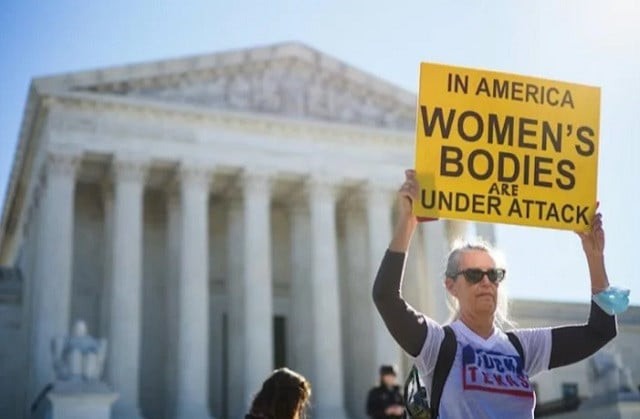US Supreme Court allows abortion providers to challenge Texas law
'Texas Heartbeat Act' bans abortion after six weeks, before many women even know they are pregnant

The US Supreme Court on Friday allowed abortion providers to pursue legal challenges to a near-total ban on abortions in Texas, but let the state's controversial law remain in effect for now.
Eight of the nine justices on the conservative-leaning court agreed that lawsuits filed by abortion providers against the Texas law may proceed in federal court, with Associate Justice Clarence Thomas as the exception.
The "Texas Heartbeat Act" bans abortion after six weeks, before many women even know they are pregnant, and is the most restrictive law passed in the United States since abortion was made a constitutional right nearly five decades ago.
Read more: 'Her heart was beating too': Poles protest against strict abortion law
A previous bid by abortion providers to halt enforcement of the Texas law failed in the nation's highest court by a 5-4 margin but a majority agreed in Friday's ruling that challenges should be heard in a lower court.
"Given the ongoing chilling effect of the state law, the District Court should resolve this litigation and enter appropriate relief without delay," Chief Justice John Roberts said in his opinion.
Laws restricting abortion have been passed in multiple Republican-led states but struck down by the courts because they violated Supreme Court rulings that guaranteed a woman's right to an abortion until the fetus is viable outside the womb, typically around 22 to 24 weeks.
The Supreme Court heard oral arguments on December 1 over a Mississippi law that would ban abortion after 15 weeks and takes aim at Roe v. Wade, the landmark 1973 case in which the court held that access to abortion is a constitutional right.
The court's conservative justices -- including three nominated by Donald Trump -- seemed receptive to potentially overturning Roe v. Wade. The court is to render a decision on that case by June.
Texas Senate Bill 8 (SB8) differs from other efforts in that it attempts to insulate the state by giving members of the public the right to sue doctors who perform abortions -- or anyone who helps facilitate them -- once a heartbeat in the womb is detected.
They can be rewarded with $10,000 for initiating civil suits that land in court, prompting criticism that the state is encouraging people to take the law into their own hands.
Also read: US Supreme Court declines to block Texas abortion ban
Many clinics in Texas -- fearful of potentially ruinous lawsuits -- have closed their doors, and the number of abortions in the state fell to 2,100 in September from 4,300 a year earlier, according to a University of Texas study.
Justice Sonia Sotomayor, in an opinion joined by the other two liberal justices, said the court should have stepped in and blocked the Texas law.
"The Court should have put an end to this madness months ago, before SB8 first went into effect," Sotomayor wrote. "It failed to do so then, and it fails again today."
"Since SB8 went into effect on September 1, 2021, the law has threatened abortion care providers with the prospect of essentially unlimited suits for damages, brought anywhere in Texas by private bounty hunters," she said.
Marjorie Dannenfelser, president of the anti-abortion group Susan B. Anthony List, welcomed the fact that the court's ruling will allow the Texas law to remain in force for now.
"We celebrate that the Texas Heartbeat Act will remain in effect, saving the lives of unborn children and protecting mothers while litigation continues in lower courts," Dannenfelser said in a statement.
Whole Woman's Health, which brought the suit against the Texas law, said it would continue to fight.
"We don't back down. Just not how we roll. We've won what seemed like impossible cases before and we know we'll do it again," Whole Woman's Health said on Twitter.
Rachel O'Leary Carmona, executive director of Women's March, another group which advocates for a woman's right to choose, expressed disappointment.
"Yet again, the Supreme Court has abdicated its duty to protect and defend the Constitution by allowing Texas's SB8, the most radical and unprecedented anti-abortion law in the country, to stand," she said.
Public opinion polls have found most Americans believe abortion should be legal in all or most cases.
But a segment of the population, particularly on the religious right, has never accepted the Roe v. Wade ruling and campaigned to have it overturned.



















COMMENTS
Comments are moderated and generally will be posted if they are on-topic and not abusive.
For more information, please see our Comments FAQ